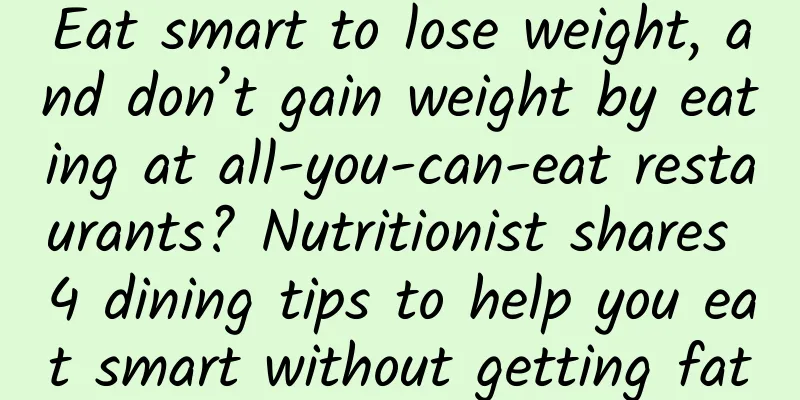Eat smart to lose weight, and don’t gain weight by eating at all-you-can-eat restaurants? Nutritionist shares 4 dining tips to help you eat smart without getting fat

|
As the epidemic situation gradually eases, the opportunities for ordinary people to dine in restaurants have also increased. Many people think that all-you-can-eat is a good deal, with everything from staple foods, cold dishes, desserts, soups or drinks. They often have the mentality of eating just enough, and after a meal, they unknowingly take on a lot of burden. Nutritionists recommend that you follow four dining principles when dining at an all-you-can-eat restaurant: "quality over quantity." This will not only reduce the chance of gaining weight, but also reduce the guilt after overeating, so you can eat smartly even when you're trying to lose weight. Nutritionist Sabrina said that she usually does not go to all-you-can-eat restaurants for meals because the quality of the ingredients is usually inconsistent and there are too many "processed foods", so she prefers to go to ordinary restaurants. Recently, she and her friends went to an all-you-can-eat hotpot restaurant, which happened to have a wide variety of fresh vegetables and fruits, a high CP value and a wide variety of food. Unlike some all-you-can-eat restaurants, there are very few choices and limited varieties, and it feels like you are forced to eat those foods. Most people think that they must "eat as much as they can" when they go to an all-you-can-eat restaurant, but don't be overwhelmed by the sight of so much food. Nutritionist Sabrina recommends that you should focus on "quality over quantity" and only eat until you are 70% full. This way, you can reduce the burden on your body and avoid losing money. Come and see the 4 secrets that nutritionist Sabrina shared about all-you-can-eat restaurants, so that you can eat smartly without adding burden. 4 tips for eating at all-you-can-eat restaurants without gaining weight Secret Technique 1/Create a calorie deficit: Control the total calories for the day and increase activity. ●Control other meals: including sugar intake, fat intake and calories. ●Exercise before and after meals: Anaerobic exercise is recommended before meals, and aerobic exercise is recommended after meals A little reminder: If you don’t want to be so diligent, just choose one, but be sure to control the number of meals for the other meals. When dining at an all-you-can-eat restaurant, eat "nutritious" foods first, which will naturally reduce your desire for high-calorie foods. For example, first choose protein + vegetable and fruit fiber (lean meat, seafood, salad, etc.) which are high-nutrient-density ingredients and eat until you are 50% to 60% full. Tip 2/Eat nutrition first, then calories: Eat "nutritious" foods first to naturally reduce the desire for high-calorie foods. The principle is to reduce overall sugar intake to avoid stimulating body synthesis and increasing hunger. The recommended dining order is as follows: ●Eat first: Choose protein + vegetable and fruit fiber, which are high-nutrient-density foods, and eat until you are 50% to 60% full. For example: lean meat, seafood, salad, hot pot, eat a large plate of vegetables and fruits first. ● Post-meal: After eating, choose staple food, sugary foods, desserts, fried foods and other foods with high calorie density. Tip 3/ Eat slowly until you are 70% full: Eating slowly can give your brain a sense of time and satiety, thus reducing excessive intake. As long as you master the "satiety stage", you can avoid overeating. ●Suggestion: Remember to chew each bite 15-20 times and eat slowly. If you eat too quickly, your brain may already be full by the time you realize it. Tip 4/ Properly combine healthy foods: Healthy foods help reduce the burden of intake and aid digestion. Before meals, you can take chitosan, garcinia cambogia, chlorogenic acid, dietary fiber and other ingredients to help reduce the absorption of fat or carbohydrates and reduce excessive calorie intake; after meals, it is recommended to supplement with probiotics, enzymes, etc. to aid digestion and absorption. A little reminder: Usually these are just auxiliary aids to the body's metabolism, so just take them in moderation. Don't treat them as magic pills and eat them without restraint. |
Recommend
How to treat bilateral ovarian polycystic changes
The ovaries are one of the female organs unique t...
What fruits are good for women with dysmenorrhea?
Diet has a great relationship with dysmenorrhea. ...
What is the reason for bleeding after curettage?
Curettage is a very common abortion surgery. Ther...
Can I take levofloxacin for candidal vaginitis?
Levofloxacin is not usually recommended for candi...
What should you pay attention to after artificial abortion? Pay attention to these points
There are many things to pay attention to after a...
How to treat habitual miscarriage? There are 5 treatments
When women have the signs of habitual miscarriage...
Gynecological examination is needed after menopause
Is it necessary to have a gynecological examinati...
Is drinking oolong tea the best way to remove fat? Do less of these, and the weight loss effect will be discounted
Many people are accustomed to drinking a cup of t...
Treatment of multiple uterine fibroids How to use medication for multiple uterine fibroids
Due to the high incidence of multiple uterine fib...
Clapping after meals helps digestion and burns fat easily
Don’t just sit on the sofa and watch TV after a m...
It is important for everyone to understand the symptoms of pregnancy
In life, many expectant mothers often worry wheth...
Self-diagnosis of gynecological symptoms. Learn these methods to prevent gynecological diseases early.
Due to the physiological structure of women, the ...
What is watery leucorrhea? There are many reasons
Perhaps many women in their lives will observe th...
What are the hazards of candidal vaginitis to patients
The incidence of candidal vaginitis is getting hi...
Drinking beer in hot weather not only helps you cool down and quench your thirst, it also has these unexpected benefits!
The temperature soars frequently in the summer. T...









